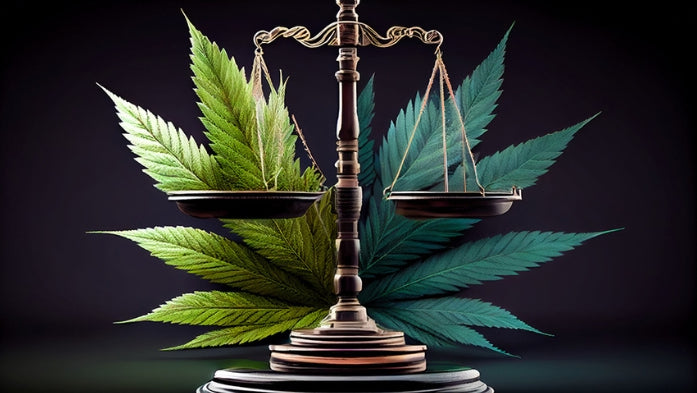Even though more and more states are legalizing adult-use cannabis, the illegal marijuana black market is more robust than ever.

When the 21st century began, the thought that cannabis could become a legal recreational drug like alcohol was laughed at by law enforcement officials, politicians and many marijuana dealers. It's still hard to believe that a plant that can grow just about anywhere, with minimal to no harmful side effects and a host of health and wellness benefits, could ever be viewed much less categorized as a dangerous and highly addictive narcotic.
Yet, following his declaration of a new "War on Drugs" in the early 1970s, President Richard Nixon demanded marijuana be listed as a Schedule I drug on the Controlled Substances List, along with heroin and meth. That classification and the subsequent aggressive policing by the Drug Enforcement Agency (DEA) and local law enforcement led to an explosion in arrests, convictions and prison terms for growers, distributors and consumers of the maligned and misunderstood flower.
However, as science and medical researchers began to debunk the outright lies about cannabis and state governments began to understand the health and wellness benefits and substantial economic power of legalizing, regulating and taxing the cultivation and sale of marijuana, slowly but steadily, state after state, beginning with Colorado and Washington in 2012, passed laws to legalize adult-use cannabis.
Over the next decade, 23 states enacted marijuana legalization reform for recreational use, while 40 established medical cannabis programs. That rapid transformation initially led to an explosion in sales revenue, which led to an equal growth in tax revenue collected for programs ranging from education to infrastructure.
With Minnesota becoming the latest state to legalize recreational cultivation and sales this past summer and a handful of others considering similar initiatives this coming Election Day, including Ohio, the spread of legal and regulated marijuana markets appears to be an inevitable tidal wave, eventually leading to the end of the federal ban still plaguing the burgeoning markets.
However, for many industry advocates and stakeholders, not all is well in the world of legal cannabis. Despite its state-legal status, marijuana is still illegal at the federal level. As a result, most legitimately run and regulated small to medium-sized cannabis companies can't open a simple checking account or take advantage of standard business tax deductions on their taxes.
To address this paralyzing conundrum, Congress has flirted with passing the SAFE Banking Act for over a decade. The latest version of the bill, known as the SAFE(R) Act, was passed by the Senate Banking Committee last week and is awaiting an official floor vote for the first time in the U.S. Senate.
The measure would allow banking institutions to work with cannabis companies without the threat of federal prosecution. It would also enable marijuana businesses to open checking accounts and utilize other essential financial tools banks and lending companies provide.
For his part, President Biden directed the Department of Health and Human Services (HHS) to conduct an extensive scientific review of cannabis last year as part of his decision to grant pardons to all individuals currently serving federal prison sentences for simple marijuana possession convictions. In that request, Biden directed the Secretary of HHS and the Attorney General to "expeditiously" review marijuana scheduling under federal law.
As a result, HHS officially recommended that cannabis be moved from Schedule I to Schedule III under the Controlled Substances Act (CSA). Suppose the DEA takes the recommendation and reschedules marijuana, which many political insiders believe the agency will do. In that case, researchers will no longer have to navigate the tedious and time-consuming registration process with the agency to gain access to cannabis for studies.
In addition to the expanded research possibilities afforded by the rescheduling, the move would enable cannabis companies to take advantage of tax opportunities and other financial instruments currently unavailable to businesses that sell Schedule I and II drugs.
While on the surface, these significant changes seem positive for the industry, many longtime activists and supporters of legalization see them as ominous and not-so-positive developments, particularly for the small and medium-sized cannabis companies struggling to navigate the complex and expensive process of licensing, taxation and market competition.
In an op-ed piece written for MJBizDaily, Andrew DeAngelo, a global cannabis consultant and strategic adviser who has worked on voter initiatives to legalize medical and adult-use marijuana and co-founded Harborside Oakland dispensary as well as the Last Prisoner Project, a nonprofit group dedicated to releasing individuals incarcerated for marijuana offenses, predicts a massive backlash as more and more growers and distributors exit the regulated industry in favor of returning to the illicit market.
In the article, he writes, "Right now, there are two markets for cannabis in most of the country: One is the traditional underground market; the other is the state-legal, licensed market. It's a tale of two markets, and there's a collision course happening between the two."
"Right now, there are two markets for cannabis in most of the country: One is the traditional underground market; the other is the state-legal, licensed market. It's a tale of two markets, and there's a collision course happening between the two."
- Andrew DeAngelo, Global Cannabis Consultant and Strategic Adviser
Deangelo and many of his fellow weed warriors helped legalize recreational cannabis in California and are passionate about the power and impact of the ancient plant. However, the emergence of Big Cannabis and the handful of deep-pocketed and well-financed multi-state operators (MSOs) forced him and many other cannabis crusaders back underground to the unregulated market.
In a recent study published by Ohio State University's Drug Enforcement and Policy Center, the legal marijuana sector in America, valued at roughly $26 billion, is being quickly consolidated under the control of a few powerful national companies. According to researchers, in 2018, the seven biggest MSOs accounted for only 3% of total revenue in the legal adult-use market. By the end of 2022, that number had expanded to nearly 18%.
The backbone of the American economy is the hardworking and imaginative small business owner. Market competition and the ingenuity it inspires built this country, and without it, stagnation begins to seep in, which can lead to an eventual economic collapse.
Mature markets from Colorado to California are reeling since the artificial boom provided by the COVID-19 lockdowns. In addition, newer markets like New York are bogged down by bureaucratic backlogs and punitively expensive and time-consuming licensing procedures.
In the meantime, the consumer just wants their cannabis, and they want it to be high quality and reasonably priced. Currently, the only players delivering the kind of product customers want to purchase are in the illicit marketplaces.
Consequently, experts like Deangelo are predicting a "Prohibition 2.0" against the current unnecessary and corporate-friendly machinations controlling state markets. And unless lawmakers and regulators wake up and listen to the pioneers who helped build the industry, the cannabis experiment could end up going the way of Big Alcohol, an outcome no one wants, and the industry can't survive.






































